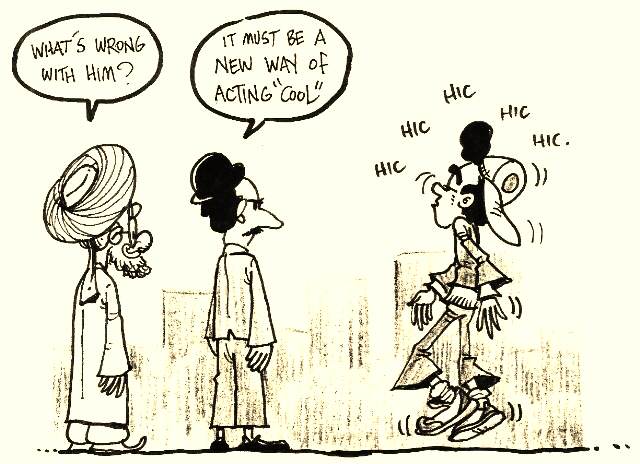Hiccups
- font size decrease font size increase font size
They appear at the most inconvenient times, and when you're out partying or at a public event, you might need to use some very subtle methods to control them.
A hiccup, medically known as singultus, is an unintentional movement (spasm) of the diaphragm, a thin membrane of muscle at the base of the lungs that separates the chest cavity from the abdomen. The spasm is followed by quick closing of the vocal cords, which produces a distinctive "hic" sound.
It is a reflex action, meaning that you do not have any control over them and may result from a large meal, alcoholic beverages or sudden excitement. In some cases, hiccups may be a sign of an underlying medical condition. Hiccups are not usually serious and in most cases the bouts only last a few minutes. Persistent hiccups, lasting longer than 48hrs, may result in exhaustion and malnutrition. The bouts may even last longer than a month, years with the longest ever recorded being 6 decades. Such attacks have been associated with significant morbidity and even death.
Pathophyisiology
When the vagus nerve or one of its branches, which runs from the brain to the abdomen, is irritated, a singultus develops. The irritation may be caused by:
- eating too fast- one swallows air along with food
- eating too much especially fatty foods or drinking too much alcohol or carbonated drinks
- Damage to the vagus or phrenic nerve
- medications that cause acid reflux
- Anxiety or stress
- Stroke or tumors of the the brain stem, and some chronic medical disorders
Management
Most hiccups will pass quickly or respond to simple maneuvers. You may apply any of the following:
- stick your fingers in your ears for 20 to 30 seconds. Or press the soft areas behind your earlobes, just below the base of the skull. This sends a 'relax' signal through the vagus nerve, which connects to the diaphragm.
- Swallowing water interrupts the hiccupping cycle, which can quiet the nerves. Gargling with water may also have the same, as rhythmic contractions of the esophagus override spasms of the diaphragm.
- Tickling the soft palate of the roof of your mouth with a cotton swab may do the trick. Or, if you're the type who enjoys getting tickled, have someone find your ticklish spots.
- Valsalva maneuver or holding your nose and closing your mouth--the way you would when you're ready to jump into a pool--for as long as you can or until you sense that the hiccups are gone.
- stick out your tongue. This exercise stimulates the opening between the vocal cords (the glottis). You breathe more smoothly, quelling the spasms that cause hiccups
- breathing into a paper bag. It increases the amount of carbon dioxide in the bloodstream, and the body becomes preoccupied with getting rid of it and forgets about the hiccups.
- Press the palm of your hand with the thumb of your other hand – the harder, the better. Alternatively, you can squeeze the ball of your left thumb between the thumb and forefinger of the right.
A medically trained professional may also perform or recommend any of the following:
- Carotid sinus massage
- Digital ocular globe pressure
- Phrenic nerve block surgery
- Digital rectal massage
- Phrenic nerve or diaphragmatic pacing
The remedies above are believed to work on two principles.
- They stifle the hiccups by overwhelming the vagus nerve with another sensation. The vagus nerve signals the brain that more important matters have arisen, so it's time to knock off the hiccups.
- By interfering with the breathing pattern, the amount of carbon dioxide in the blood increases. This probably causes the body to become more concerned with getting rid of the carbon dioxide than making hiccup.
Medications
Some medicines that may be prescribed for the treatment of long-term hiccups include:
• chlorpromazine
• haloperidol
• baclofen
• metoclopramide
• gabapentin
If you’ve been having persistent annoying bouts of hiccups (last more than 48 hours or if they are so severe that they cause problems with eating, sleeping or breathing) consult your doctor today and put a stop to it.
